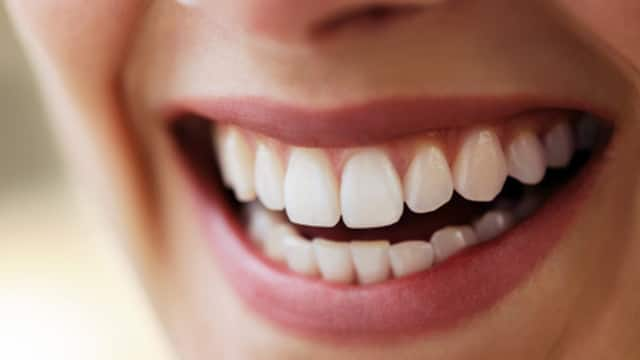What Is Tooth Sensitivity?
According to the National Health Portal of India, Dentinal Hypersensitivity is commonly known as tooth sensitivity. If a person feels mild to severe discomfort or pain on consuming hot, cold, or sweet food and drinks or breathing in cold air, it indicates sensitive teeth. It is a very common clinical presentation and causes considerable concern for patients.
The tooth has outer enamel layer that protects the dentin underneath. The dentin comprises of microscopic tubules or canals that are connected to the pulp of the tooth. If dentin loses its protective covering of enamel its tubules get exposed. These tubules allow heat, cold or acidic foods to reach the nerves and cells inside the pulp of the tooth and the tooth becomes sensitive.
- Toothbrush abrasion: brushing too hard, and brushing from side to side, causes enamel wear, making freshly exposed dentine sensitive.
- Dental erosion: it is loss of tooth enamel due to attacks of acid from acidic food and drinks. If enamel is worn away, the dentine underneath is exposed which may lead to sensitivity.
- Gum disease: a build-up of plaque or tartar can cause the gum to recede down the tooth and even destroy the bony support of the tooth. Due to receded gums, roots of the teeth get exposed and become more sensitive. Pockets can form in the gums around the tooth, making the area difficult to keep clean and the problem worsen.
- Tooth grinding: a habit which involves clenching and grinding of the teeth. This also causes the teeth enamel to be worn away, making the teeth sensitive.
- A cracked tooth or filling: a cracked tooth/filling is the one that has broken. Tooth bleaching: some patients have sensitivity for a short time during bleaching or after bleaching
What Causes Tooth Sensitivity?
Various things can cause tooth sensitivity. Some of the most common causes include:
- Worn tooth enamel from using a hard toothbrush and brushing aggressively.
- Tooth erosion due to highly acidic foods and beverages.
- Tooth decay, worn, leaky fillings, and broken teeth that expose the dentin of your tooth.
- Gum recession that leaves your root surface exposed.
- Grinding your teeth at night.
- Post dental treatment sensitivity is common but temporary, especially with crowns, fillings, and tooth bleaching.
Sensitive Teeth and Age
Sensitive teeth may occur at any age. However, according to the National Health Portal of India, studies showed that in most populations, 10-30% of the general population suffer from dentinal hypersensitivity. Although the exact reason for this is unknown, it may be related to the fact that the physical structure of the tooth changes with age. However, older individuals are more likely to have receding gums, one of the causes of sensitive teeth. Sometimes the main issue is wear and tear on the tooth enamel, which occurs over time.
How Do You Treat Tooth Sensitivity?
In-Office Treatment
Because a more complex dental problem frequently causes extremely sensitive teeth, it's important to see a dentist and have the issue treated directly. The solution may involve a crown, inlay, or bonding, depending on the severity of the problem. If you have gum disease that has progressed to a chronic or advanced stage, you'll need to treat this as well. Your dentist can help make a treatment plan.
If you have lost gum tissue from the root, your dentist may recommend a surgical gum graft to cover the roots so they're protected again. According to the Indian Dental Association, the treatment for tooth sensitivity includes sealing of the exposed tubules using agents in severe cases using dental cements or composites. It can also be reduced by using toothpastes specially made for sensitive teeth. Dentists also suggest application of fluoride sealant on the crown of the teeth. The sealant covers the exposed dentin and as a barrier against pain. If the above treatments are not effective then root canal therapy is recommended as root canal could be the right solution for teeth sensitivity. This can make the tooth non vital to pain and protected by crowning it.
At-Home Treatment
If your tooth sensitivity is less severe, you can treat it with a few simple at-home tactics. You might be able to find some relief from a desensitising toothpaste that helps protect the tooth surface. Your dentist might also recommend a fluoride gel treatment, strengthening your current tooth enamel, decreasing the sensations sent to the nerve.
The best treatment for tooth sensitivity, though, is prevention. Once your tooth enamel is worn down, you can't get it back. Proper toothbrushing and flossing techniques can prevent sensitive teeth. It will promote healthy teeth and gums regardless of how sensitive your teeth are. Be careful not to brush your teeth too hard, as that can wear down the tooth enamel over time. Try using a soft-bristled toothbrush and a desensitising toothpaste to help protect your enamel.
At your next appointment, talk to your dentist if you are experiencing tooth sensitivity. He or she can provide the correct diagnosis and recommend treatment options to get your smile back on track.
This article is intended to promote understanding of and knowledge about general oral health topics. It is not intended to be a substitute for professional advice, diagnosis or treatment. Always seek the advice of your dentist or other qualified healthcare provider with any questions you may have regarding a medical condition or treatment.
ORAL HEALTH QUIZ
What's behind your smile?
Take our Oral Health assessment to get the most from your oral care routine
ORAL HEALTH QUIZ
What's behind your smile?
Take our Oral Health assessment to get the most from your oral care routine











